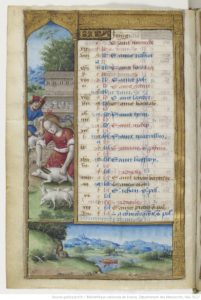
“June”, kalendar page from Les Petites Heures d’Anne de Bretagne (The Little Hours of Queen Anne of Bretagne), by the Maître des Triomphes de Pétrarque. From Bibliothèque nationale de France, Paris (France).
It is said that Ephrem made several legendary journeys. In one, he visits St Basil of Caesarea; in another, St Pishoy in the monasteries of Scetes in Egypts. Ephrem is venerated as an example of monastic discipline in the Eastern Orthodox Church, and his journeys are cited as a force in the spread of monasticism throughout the church.
Ephrem’s most famous work is this prayer, which is recited at every service during the Orthodox observance of Great Lent, and also during other fasting periods.
*The original Greek is σωφροσύνη (sōphrosúnē), which does not have the sexual overtones that “chastity” does in modern English. Better modern translations would be “sobermindedness” or “prudence”. Also, the original Greek is “give me not”, not “take from me ”.
Ephrem is commemorated on June 9, the date of his death, although between 1920 and 1969, it was observed in the GRC on June 18.


